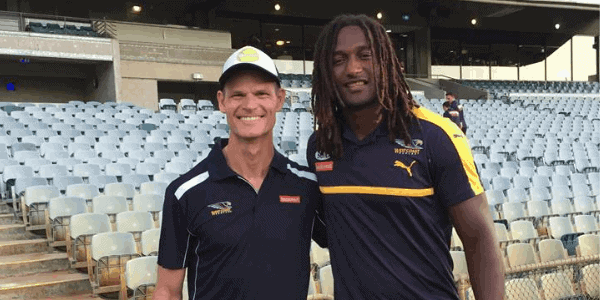With the AFL season well underway, many of us are launching into pre-season training for our own favourite winter sport. Of course, the professional players kicked off their pre-season months ago, and are extremely well prepared for the demands of the game.
West Coast Eagles midfielder Andrew Gaff regularly clocks up over 15km of running each game, and as AFL news states “He pulls up terribly after games, but he always gets himself ready to go again the following match”.
So, what is it exactly that the AFL players do to recover so well, and how do they back up again each week as they include up to 10 training sessions as well?
We turned to the Sports Dietitian for the West Coast Eagles, the amazing woman who has fed, monitored, tested and hydrated them over the past five years, culminating in the 2018 premiership. We asked Simone Allen… “What are three things that AFL players know about nutrition that we should too?”
1. The one percenters are great… but the basics are vital. I’m in my fifth season with West Coast so I’ve been lucky enough to work with many players from their first year with the team. While all the fine-tuning of nutrition is important – getting the basics right first is essential. So, for the first year at the club we focus on every day nutrition (the base of the pyramid), getting enough calcium, carbs and protein and fuelling right before, during and after training sessions. Once the basics are on track, we focus on nailing game day nutrition (the middle of the pyramid) – carb loading the day before, pre-game meal and hydration, carbs and electrolytes during the game. Finally, we get to the top of the pyramid and look at the 1%’s – caffeine, beta-alanine, cherry juice etc..for optimum performance. BUT the players know these won’t do anything if there aren’t adequate carbs on board, or they are dehydrated at the beginning of the game.
2. Fuel for conditions. When we have a game where it will be unusually hot or humid, there is extra focus on the detail. One game last year, near the end of the season, it was going to be unseasonably hot, so I drew up a list of players that wanted extra slushies, ice towels, pickle juice, electrolyte etc. for each quarter and allocated a trainer or myself to each role to ensure each player was adequately cooled and hydrated at the break. Bear in mind that when playing in the colder winter months, hydration can be easily overlooked too. Those extra steps to instigate a hydration plan can make a big difference.
3. Recovery Fuel on Game Day. Our AFL players are lucky – every game finishes and their individual recovery fuel and food is waiting for them in the change rooms. However, when they play a WAFL game or for recreational players this isn’t the case. I impress on them how important it is to make time to pack recovery food and drink – this really pays off when all that’s available on ground is meat pies and sausage rolls! The importance of good recovery becomes evident towards the back end of the season – the closer we get to September, the hard it is to keep backing up each week. Placing a focus on high nutrient recovery food which includes protein and carbs ensures that muscle glycogen levels are up and muscle soreness is down, and therefore recovery is optimised.
So, what are the most important takeaway tips that you can use for your winter sport season?
- Every day nutrition is vital – ensure you are getting enough protein and carbs through high nutrient food (basically, get your 2 fruit and 5 veg in every day people!). Make sure you have a carb-rich pre-game meal up to three hours before the game (try sushi or even pumpkin soup + bread roll, and top up with a banana closer to the game).
- For training or games over one hour – add in a fuel source like a natural sports drink to avoid glycogen and energy levels running low during the game and by sipping throughout the game you will also maintain hydration and electrolytes.
- Hydrate to the conditions – whether it is warm or cold, make sure you are well hydrated going into the game or training, and throughout the session as well.
- Plan your recovery – pack some recovery food and fluid. Look for carbs and protein like a high protein yoghurt plus fruit, a chicken sandwich, or make a protein + fruit + milk smoothie for convenience. Get this on board before you head to the bar and your recovery is already kick-started!
- Alcohol can delay recovery, exacerbate injuries and have a negative impact on body composition and hydration. Players should make wise choices with alcohol, especially after games.
Implementing some simple and smart nutrition strategies early on in your winter season can help not only with your body composition (ie getting to an ideal playing weight), but it can also increase your chances of getting through the season injury free… and hopefully on to that premiership win too!
Happy training!
Belinda x

